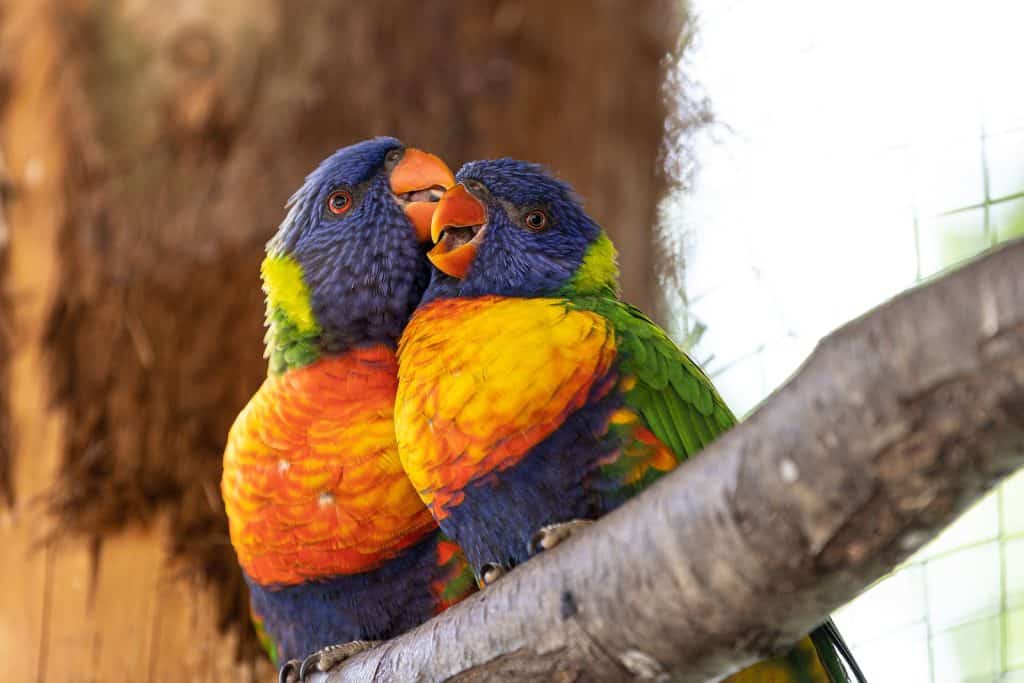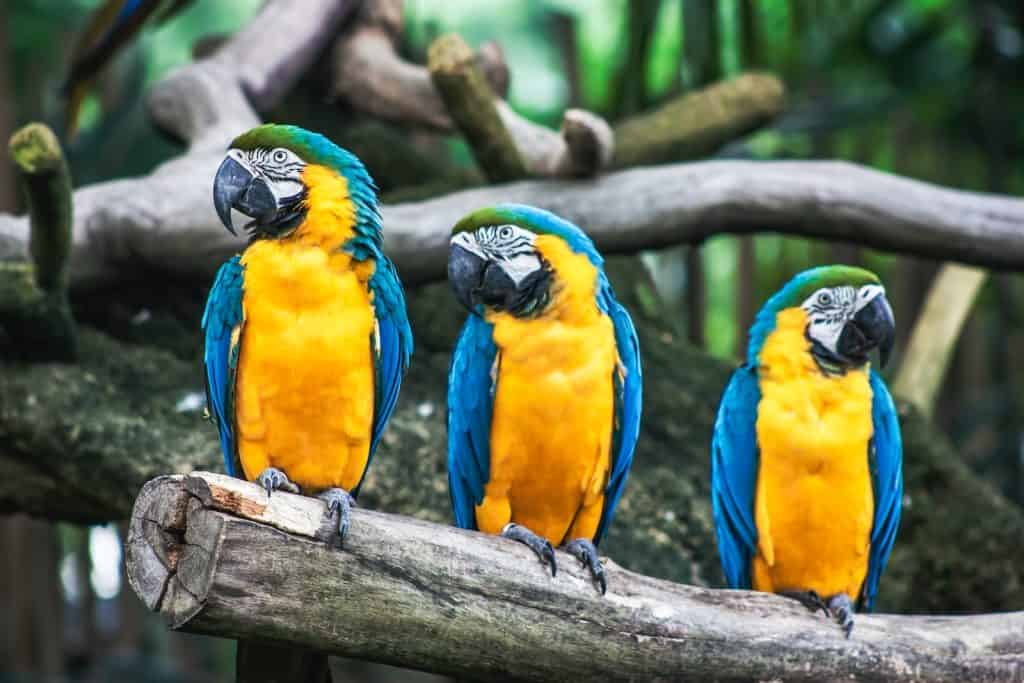
A Macaw bought from a breeder will be fully weaned and therefore no special care is required. If you plan to breed Macaws, or if your Macaws unexpectedly bred Macaws, you will need to learn how to care for babies. Their needs are different than those of birds that have been weaned or adults.
It is possible to raise a Macaw baby into a happy and healthy bird. It’s not an easy task. Hand feeding is an important part of the process and can be difficult to master. With a little guidance and a lot of dedication, you can achieve success. This guide will help you make caring for baby Macaws easier and more enjoyable.
It’s all about the parents

The parents of a baby Macaw should take care of their baby during his first two weeks of life. Parents should be provided with more food and a greater variety of foods. Fresh vegetables such as celery, carrots, and spinach are important. Also, provide fruits and berries like blueberries, bananas, and melons. Whole grains, such as oats are also good options.
Parents will use this extra food to feed their babies. This is why food should be varied in nutrition, flavor, texture, and quantity. The baby will be fed the food by its parents, who will then regurgitate it. This provides natural digestive enzymes to help the baby’s digestion.
It is a smart idea to add food to the habitat. Also, bedding can be added to the habitat to ensure comfort and warmth for the babies. The parent Macaws can do the majority of the work with these additional tools and resources. Parents and babies should be supervised throughout the day. Regular interactions with them and their parents are also important.
How to Care for a Baby Macaw On Your Own
You must assume the primary caregiver role if your baby Macaw’s parents cannot be there. Feeding a baby Macaw can be the most difficult aspect of care. Baby Macaws can’t eat by themselves so they will need you to provide every bite. You will need all the necessary tools to properly feed baby Macaws.
Here’s what you need:
Kitchen Scale: This tool is used to measure the weight of a baby Macaw to see if they are eating enough to maintain their weight as they age.
Incubator: This keeps baby Macaws warm on cold days and at night.
Bedding Material: Comfort for babies can be provided by cotton cloths, small fluffy blankets, and old sweaters.
Pipettes and Syringes are used to give specialty formula to babies or chicks until they can eat whole food on their own.
Antibacterial soap: To prevent germs from getting into the baby’s body, this should be applied before any physical contact.
How to Hand Feed Baby Macaws
To feed a baby Macaw you will need both hands. Therefore, the baby should be placed in small containers, such as a bowl covered with a towel. This will allow it to reach for food and not fall over. Once the baby is ready to be fed, prepare the formula by boiling water according to the instructions.
The formula can be poured into a pipette, syringe, or spoon. Next, place the pipette/syringe in the baby’s mouth. If your baby is losing weight each day, you will know if you are giving it enough formula. Increase the amount of formula you give to your baby if weight gain is not evident.
When and how often to feed baby macaws
The newborn Macaw should be fed every two hours even during the night. Multiple human caregivers can take turns to provide this care without placing too much pressure on one person. At around 2 weeks old, the chick becomes a baby Macaw and needs to be fed every 4 hours.
Weening baby macaws
Baby Macaws can be weaned off hand-feeding at 3 months. The bird will be able to eat whole foods and can then digest them by itself. The weaning process should take place slowly. You should start by giving the formula in a bowl, not through a pipette or syringe. To ensure the bird is receiving enough nutrients and calories, you may need to continue hand-feeding it for a few weeks.
After the bird is able to eat from a bowl and finishes all meals, you can introduce seeds, fruits, vegetables, and whole grains. As the main course of any meal, a commercial parrot mix should always be served.
Working with a veterinarian
To minimize mistakes and ensure you are ready to deal with any issues that may arise such as refusing to feed a baby formula, it is important to consult a veterinarian before caring for your baby Macaw. You will be supported and guided by a veterinarian throughout the hand-feeding process. A Macaw’s entire life should be inspected by a veterinarian.
How often should a baby’s macaw be fed?
Approximately every four hours Newborn macaws require nearly the same amount of feeding as a newborn human infant, but by two weeks, they only need to eat every four hours – including overnight. Small amounts of strained meats and mashed fruits and vegetables can be added to the formula of older chicks.
What should a macaw not be fed?
Avocados, parsley, rhubarb, chocolate, fruit seedlings, milk, and related dairy products.
Do macaws consume bananas?
The basic answer is that parrots can consume bananas. Bananas, in fact, should be included in their diet as part of their regular fruit consumption. Unlike many other fruits that might cause problems (for example, parrots cannot consume apple seeds), bananas offer no risk to our feathered companions.
Can macaws consume cucumber?
Most cucumbers are edible to parrots. Cucumbers can be eaten raw, cooked, mashed, or sliced. The seeds do not need to be removed because they are not poisonous to birds.
What are the enemies of macaws?
The macaw’s principal predators are larger birds of prey, snakes, and monkeys.
What is the preferred meal of a macaw?
In the wild, macaws eat a range of seeds, nuts, fruits, berries, and plants such as leaf buds. A greater fat content appears to be particularly helpful for certain macaws, such as the Hyacinth Macaw.
What are the macaws’ favorite foods?
Grasshoppers, roaches, and snails are especially favorites. Palm fruit and figs are two of their favorite fruits. Macaws have also been observed eating a variety of items that should be poisonous to them; we will hear more about this later.
How can you get macaws to quit screaming?
When bored, macaws may frequently shout in an attempt to occupy themselves. If you haven’t given your parrot any toys to play with in their cage, try introducing some. Giving children a means to stimulate their brains and have some enjoyment may leave them with little time to scream.
Why is my macaw growling?
Low, guttural growls suggest a stressed and angry parrot who is likely to bite if approached. Growling parrots frequently lift their neck feathers and fan their tails, making them seem tense and ready for action.
What should a newly hatched macaw be fed?
Provide fresh vegetables such as celery, carrots, and spinach, as well as fruits and berries such as melon, bananas, and blueberries. Whole grains, such as oats, are also recommended.